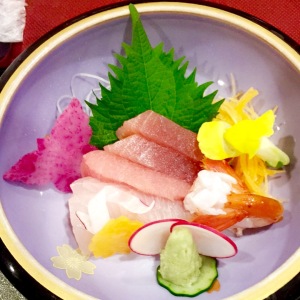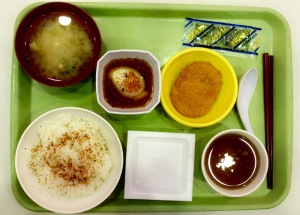Hello! Welcome to post eight of our study abroad experience in Japan! Today in class we looked at Japanese Society and Daily Life. This subject included the Japanese work ethic, the low crime rate, family life, longevity, cuisine, and so much more.
So far, we’ve looked at how diligent the Japanese work ethic is. Everyone does his or her part in the collective whole to bring about great results, and this doesn’t seem to be a failing system by any means. They work slowly and take time for details so that every result is close to perfect. The level of respect that Japanese people show to everyone and everything allows for positive growth to occur. Moreover, this contributes to the low crime rate.
Although a lot of outside influences have had an effect on this aspect of Japanese culture in recent years, for the most part, Japan is one of the safest countries in the world. It is not uncommon to see children walking by themselves or people leaving bicycles unchained. Again, I suspect this stems from the ingrained respect in the culture.
Because of so many honor-related traditions, Japanese society is so inclined to always put that first. This is evident in their family lives, especially in the way that they treat elders and honor ancestors. In fact, they celebrate their ancestors during a festival every summer – the Obon festival.
Japanese people are known to live some of the longest life spans of all the cultures in the world. The life expectancy for men in Japan is about 80 years old and for women, about 85. In Okinaw a, the women can live to 90 years old. This says a lot about their diet, as many Japanese employees are very stressed from working so hard, and while some people smoke, many drink to socialize with people from work (this is called nomikai). No doubt, the level of cleanliness in their diet keeps many diseases away. Cancer rates are relatively low, and it seems this is due to the natural tendencies of the food. It’s very rich in antioxidant
a, the women can live to 90 years old. This says a lot about their diet, as many Japanese employees are very stressed from working so hard, and while some people smoke, many drink to socialize with people from work (this is called nomikai). No doubt, the level of cleanliness in their diet keeps many diseases away. Cancer rates are relatively low, and it seems this is due to the natural tendencies of the food. It’s very rich in antioxidant s and nutrients.
s and nutrients.
It’s been very exciting learning about the Japanese lifestyle, as there is so much to absorb and use in daily life. My peers and I agree that within the first week of being here we felt healthier. So here’s to living genki – KANPAI!